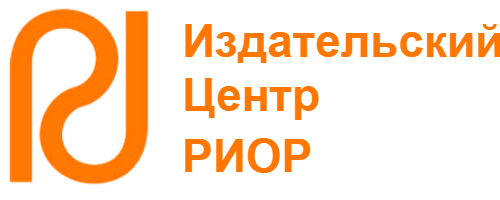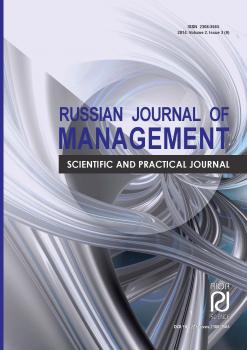A not fully used HR potential is a common trend for engineering design companies in gas and oil industry. A reduction of staff in a period of decreased business activity is unacceptable, because it results in reduced competence of engineering design companies in present and in the future. Opportunities of decreasing the level of unused competences result from enhancing management mechanisms. Broadened managerial functions of planning provide the company with stability, cyclicality and effective production, realization and control of the process. Motivation should take into account peculiarities of employees’ competences and should be fair and transparent. Changes in methods used in management and organizational structure should be in line with the goals. The proposed management scheme of temporary unused competences of employees in periods of reduced production activity allows to increase competitiveness of engineering design companies in perspective.
management system, unused human resource competences, HR policy, planning, motivation
Одной из актуальных тем экономики является задача повышения производи-тельности труда в организации. Расчетными величинами для оценки этого показателя в денежном выражении являются выручка от реализации и численность персонала. Исследование производственной загрузки ведущих проектных организаций ОАО «Газпром» позволило оценить отставание темпа роста выручки по отношению к ин-дексу роста численности персонала, означающее снижение производительности труда и наличие неиспользуемых компетенций персонала (рис. 1).
Объектами анализа выступили шесть проектных организаций газовой промыш-ленности: ОАО «Гипрогазцентр» (г. Нижний Новгород), ДО-АО «Газпроектинжиниринг» (г. Воронеж), ОАО «ВНИПИгаздобыча» (г. Саратов), ОАО «Гипроспецгаз» (г. Санкт-Петербург), ОАО «СевКавНИПИгаз» (г. Ставрополь), ПАО «ЮжНИИгипрогаз» (г. Донецк). Анализ соотношения выручки и численности персонала перечисленных организаций выполнен по базе данных «Контрагент» [2] и отчетных данных перечисленных организаций в сети Интернет.
1. Armstrong M. Praktika upravleniya chelovecheskimi resursami [Practice of human resource management]. St. Petersburg, Piter Publ., 2012.
2. The database “Kontragent”. URL: http://www.k-agent.ru.
3. Vihanskiy O.S., Naumov A.I. Menedzhment [Management]. Moscow, INFRA-M Publ.; Magistr Publ., 2010.
4. Standard ISO 9001-2011 “Quality Management System. Requirements”. Moscow, Standartinform Publ., 2012. (in Russian)
5. Standard ISO 9001-2011 “Quality Management System. Fundamentals and vocabulary”. Moscow, Standartinform Publ., 2012.
6. Standard for Russian Federation ISO 10015-2007 “Organisation Management. Guidelines for training”. Moscow, Standartinform Publ., 2008. URL: http://www.kodeks.ru/search.html.
7. Gusev A.A. Organizacionno-metodicheskoe obespechenie processa formirovaniya i razvitiya klyuchevih kompetentnostey rukovoditeley transporta [Organizational and methodological support of the process of formation and development of key competencies of managers of transport]: abstract of Ph.D. dis. Ekaterinburg, 2013. URL: vak.ed.gov.ru.
8. Dolgov V.A. Instrumenti informatizacii processov formirovaniya professional’nih kompetenciy po upravleniyu innovacionnoy deyatel’nostyu integrirovannih neftyanih kompaniy [Tools of informatization of processes of formation of professional level competence in the management of innovation of integrated oil companies]: abstract of Ph.D. dis. Moscow, 2012. URL: vak.ed.gov.ru.
9. ZaycevaL.Ya. Razrabotka metodov upravleniya chelovecheskim kapitalom v celyah innovacionnogo razvitiya hozyajstvuyuschih subjektov [Development of methods of human capital management in order to innovative development of economic entities]: abstract of Ph.D. dis. St. Petersburg, 2014. URL: vak.ed.gov.ru.
10. Kalinina T.V. Funktsional´no-tipologicheskiy analiz chelovecheskogo potentsiala [Functional-typological analysis of human potential]: abstract of Ph.D. dis. Nizhny Novgorod, 2007. URL: http://elibrary.unecon.ru.
11. Klimov S.M. Formirovaniye, ispol´zovaniye i strategicheskoye upravleniye intellektual´nymi resursami obshchestva v usloviyakh rynochnoy transformatsii rossiyskoy ekonomiki [Formation, the use and strategic management of intelligent resources of society in the conditions of market transformation of the Russian economy]: abstract of Ph.D. dis. St. Petersburg, 2001. URL: http://elibrary.unecon.ru.
12. Kurs ekonomicheskoy teorii [The course of economic theory] / edited by prof. M.N. Chepurin, prof. E.A. Kiseleva; 7th ed., expanded and revised. Kirov, ASA Publ., 2012.
13. McClelland D. Human Motivation. St. Petersburg, Piter Publ., 2007.
14. Menedzhment v sotsial´nykh i ekonomicheskikhsistemakh [Management in social and economic systems: theory and methodology] / edited by S.D. Reznik; 2nd ed., revised and expanded. Moscow, RIOR Publ., INFRA-M Publ., 2013.
15. Nuts S. A. Principles for the identification of latent competitive potential of entrepreneurial structures. Collection of articles on the materials of 30th International scientific-practical. conf. No 2 (27). 26.02.2014. Part I. Novosibirsk, 2014. P. 96-102. URL: sibac.info/13586.
16. OdegovYu.G., Abdurahmanov K.H., Kotova L.R. Ocenka effektivnosti raboti s personalom: metodologicheskij podhod [Evaluation of the effectiveness of work with personnel: a methodological approach]. Mocow, Alfa-Press Publ., 2011.
17. Reznik S.D., Bondarenko V.V., Udalov F.E. Personal’niymenedzhment [Personal management]. 4th ed., revised and expanded. Moscow, INFRA-M Publ., 2014.
18. The Labour Code of the Russian Federation of December 30, 2001 No 197-FZ. URL: http://www.kodeks.ru/search.html.
19. Schein H. Organizational Culture and Leadership. St. Petersburg, 2002.














